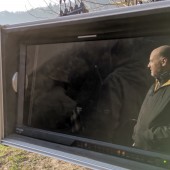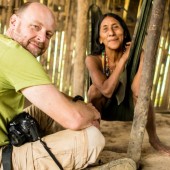Petr Horký: to every man there belongs a certain dimension of heroism
May 24, 2021
What did director and documentary filmmaker, producer, writer, Youtuber and traveller Petr Horký learn during his polar expeditions? Why does he refuse to be solely dependent on his work and why is it important for him to fulfill his life dream? Or at least try for it?
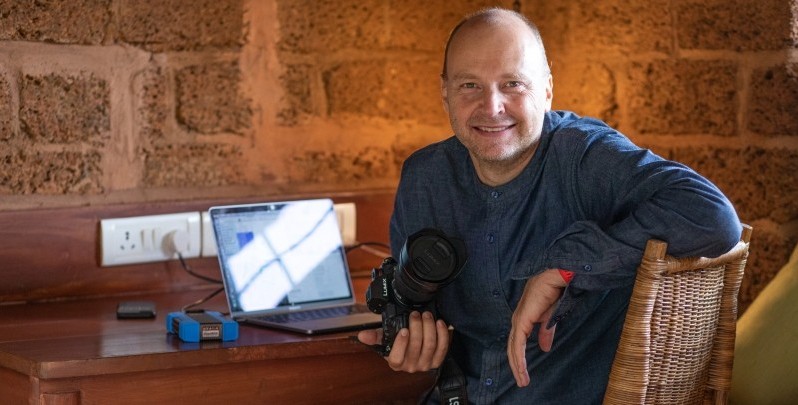
"Several interesting things have arisen here, because of which you are suddenly curious about how they will happen and how it will all turn out - suddenly it is an adventure," says Petr Horký about shooting a commercial for BUSHMAN.
A guy who is all smiles and never looks for the reason why it doesn't work, yet is always looking for a way to do it as best he can. But Petr is a man with a rich life story who has travelled over almost all of the globe and as a director and producer, among other things, documents the changes in the world. He’s a presenter and, thanks to Covid, also an ardent Youtuber, who tries to grab what’s relevant in the flood of information. Because he enjoys it.
Petr Horký is also a polar explorer, and as he says, “when I am at the Pol, I meet my true self inside me. And it’s the bit with a heroic dimension.” Here we come to the roots of his collaboration with the BUSHMAN brand, for which he directed the first television spot in its history. But let's not run ahead of ourselves…
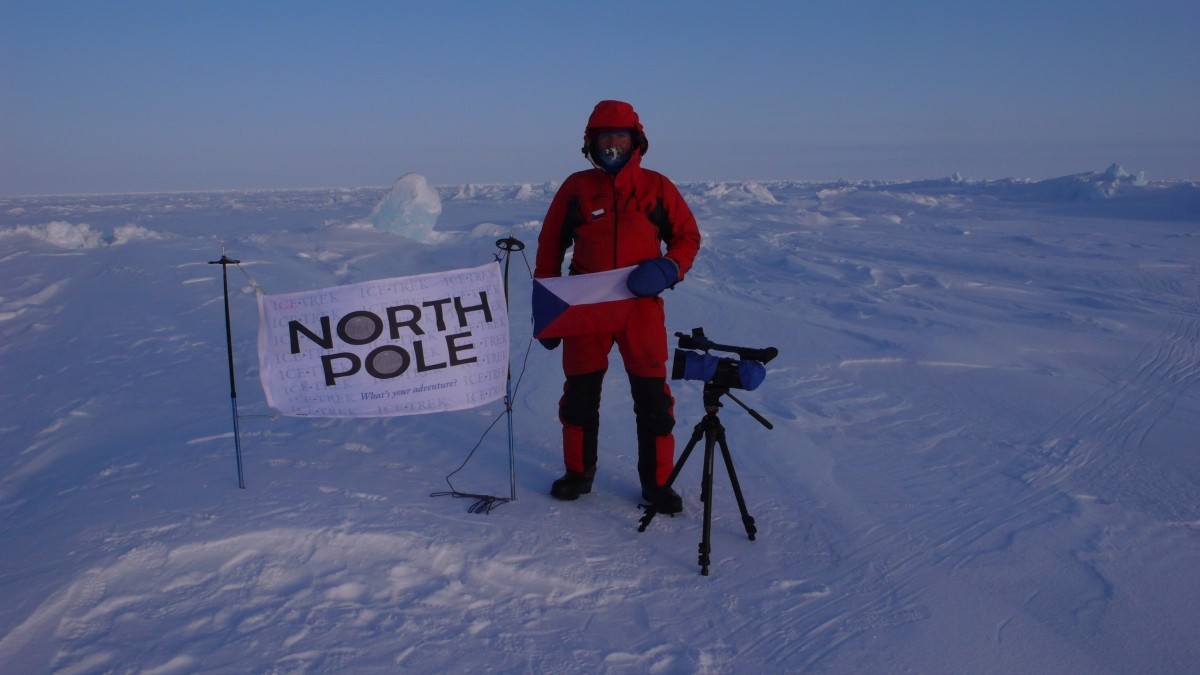
BUSHMAN: On your web pages you have a business card with Petr Horký - director and polar explorer on it, and petr_horky_polarnik on Instagram. Why the polar? Did you have that desire to go there from the beginning and what were you looking for, or was it just a given that you’d do this?
PETR: As a little boy, I was fascinated by books about the first polar explorers who let their ships freeze in the ice. Shackleton and the Endurance Expedition Across Antarctica was one, and Nansen and his expedition with the ship Fram to the North Pole was another. Then I saw a film by Pala Barabáš with Peter Valušiak, whom I still consider as my friends today, about the transfer of the North Pole from Russia to Canada. It culminated when I looked at frozen Greenland below me on my flight to America for perhaps forty minutes. I already said to myself: I want to be there, I want to go there. Then one day I found out that I might be able to raise the money for just such a trip to the North Pole.
BUSHMAN: In addition to money, such an expedition also requires a strong physique…
PETR: That's when I had a bit of a beer belly and I was starting to think that something like such an adventure wasn’t for me anymore. But I said to myself: Dude, now you have the opportunity to fulfill one of your biggest dreams in life, and the only one who stands in the way is yourself. At least I have to try it, even if I have to say that I failed. But at least I won't have to live with the knowledge that I'm the one who tripped up the dream. I started training, worked hard for a year and Mirek Jakeš, a Czech polar ace, started teaching me how to work in the polar regions - his method is very close to the style of ‘jump into the water and swim’. So we went to the North Pole in 2008 and he says: Yeah you don't have these gloves? It's probably going to be cold, um, well, yeah. But one learns really well this way, he has given me great know-how. When I crossed Greenland two years later, I went with soldiers from British Special Forces, and they learned from me stuff from the Jakes Polar School. Because the British army can't do it the way Jakes can do it, and the way he taught me.
BUSHMAN: What did you learn from the Pole? What fascinates you most about the place?
PETR: Of course, encounters with wildlife - these are the places in the world where you still won't come across a hotel. And then when you get down to the line, you find yourself close to what the BUSHMAN brand is about.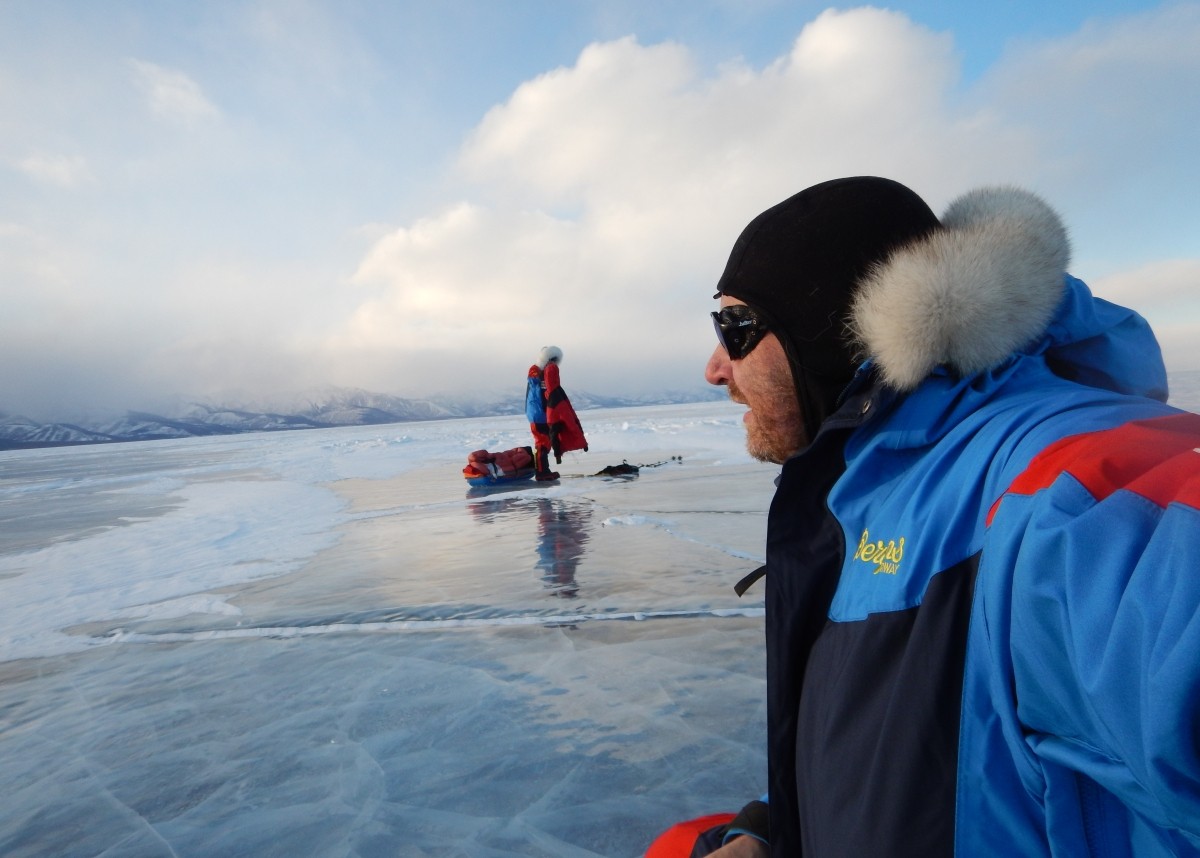 In the modern world, there are so few situations where I can feel like a real guy. To some it may sound pathetic or just boyish bullshit, but I think a guy's life should have a certain dimension of heroism. Just as I think that part of a woman's beauty is kindness, attention and sensitivity, so I think that part of manhood is heroism. And it doesn't have to be in the sense of saving passengers in the water as the Titanic sinks, but maybe it’s to have the courage to stand up to a boss who's lying. The courage to leave a job where they want to make you a moron. The courage to stop work and go to the Pole for two or three months, not knowing how it will be after returning to work and other things, or how it will actually turn out on your own journey. When I'm at the Pole, I then meet the guy inside me. And also the bit with its dimension of heroism.
In the modern world, there are so few situations where I can feel like a real guy. To some it may sound pathetic or just boyish bullshit, but I think a guy's life should have a certain dimension of heroism. Just as I think that part of a woman's beauty is kindness, attention and sensitivity, so I think that part of manhood is heroism. And it doesn't have to be in the sense of saving passengers in the water as the Titanic sinks, but maybe it’s to have the courage to stand up to a boss who's lying. The courage to leave a job where they want to make you a moron. The courage to stop work and go to the Pole for two or three months, not knowing how it will be after returning to work and other things, or how it will actually turn out on your own journey. When I'm at the Pole, I then meet the guy inside me. And also the bit with its dimension of heroism.
When I talked to Sigismund and Hanzelka years ago, they recounted how StB agents had summoned them for questioning - clearly that they were afraid because they did not know if they would finish them off or threaten them with their loved ones. But they said: We went there saying that if we weren't afraid of skull hunters in Ecuador, we wouldn't be afraid of some lousy secret police agent. And that's it: these things suddenly give a person strength in other life situations.
BUSHMAN: I assume that even when you’re shooting…
PETR: Come on! I talked about it with Robert Fulghum, who wrote the book Everything I Really Need to Know, I learned in kindergarten. And I told him that I would add that everything I needed to do in adulthood, I learned from my Polar expeditions. He laughed and said: Yeah, but it's still coming out of that kindergarten.
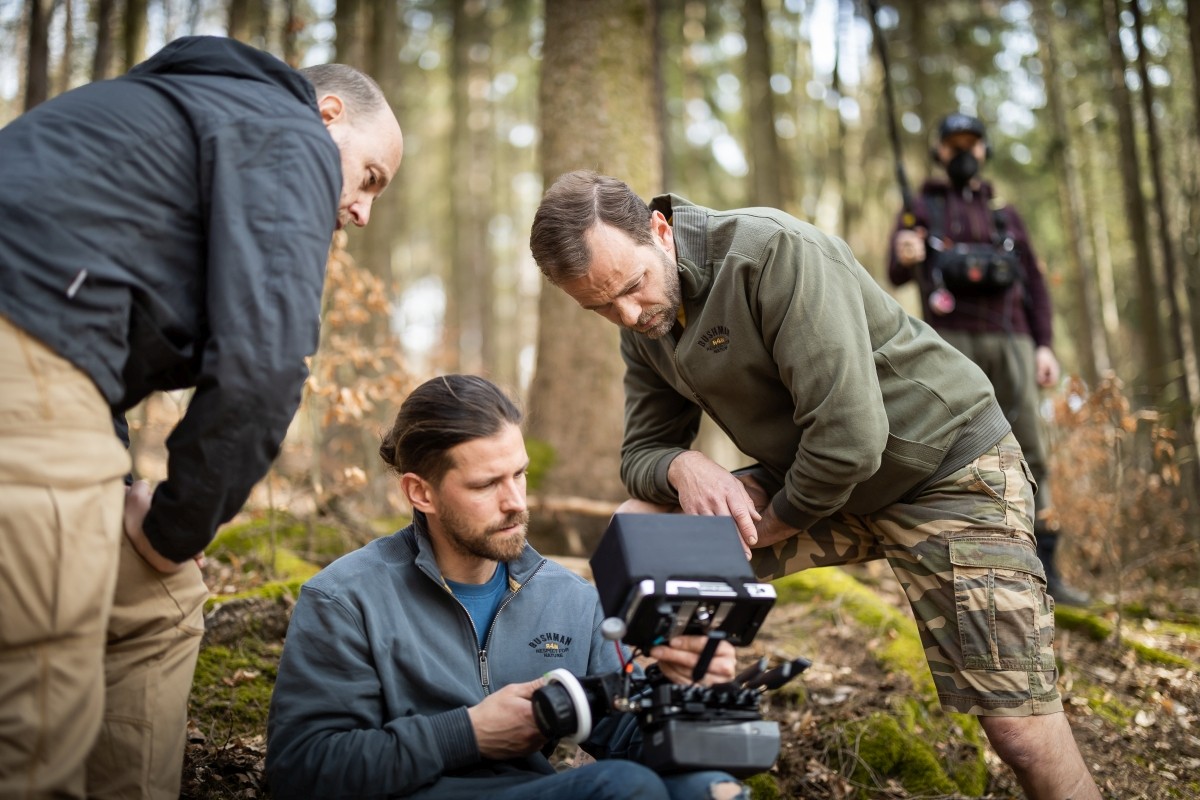 At the Pole, I learned a lot of things that are good for everyday life. One of them is that if I can handle it, I don't need to explain it to everyone and show it off. This means that when I'm on the set, I don't need everyone to sit on their asses and say: Bacha, be quiet, director Horký is creating and now something arises out of his ideas – so you can't talk. Hey, I just want the shot to be bloody good, and if I feel like the cameraman has a better view of how it should be done than I do, I'll invite him, come tell me how we're going to shoot it. If I feel that the actor is important for this or that he needs some adjustment to the dialogue or whatever, I’ll invite him over and we’ll discuss it together…
At the Pole, I learned a lot of things that are good for everyday life. One of them is that if I can handle it, I don't need to explain it to everyone and show it off. This means that when I'm on the set, I don't need everyone to sit on their asses and say: Bacha, be quiet, director Horký is creating and now something arises out of his ideas – so you can't talk. Hey, I just want the shot to be bloody good, and if I feel like the cameraman has a better view of how it should be done than I do, I'll invite him, come tell me how we're going to shoot it. If I feel that the actor is important for this or that he needs some adjustment to the dialogue or whatever, I’ll invite him over and we’ll discuss it together…
One small thing, but a specific situation from shooting this spot for BUSHMAN with Lukáš Langmajer: we are on the platform and I say to him: I would really like you to stand here with the script and say a passage from it that could relate to everyday life. Can't you find something to suit you like that? And he said: That's interesting, I'll try to find something. The moment we share the creative process together, the result is always better. Two heads are better than one, even if he’s a world record holder running solo.
BUSHMAN: You have a lot of shooting experience, but what do you prefer to shoot: what you come up with by yourself, or to order for someone else?
PETR: It applies to any human activity, and as a filmmaker I say that the filmography of films and projects I have not made is as important as the filmography of projects I have made. By that I mean that what I don't want to shoot, I refuse. Thanks to that, with everything I've shot - whether it's a product video, a movie for a cinema, a series with the climber Adam Ondra or an advertisement for BUSHMAN - I'm able to say that I had a reason to go for it - and I'm glad I'm was there: I’ve enjoyed it and it's a part of my life. Fate was kind to me in that I was never put in a position that I had to accept an offer I didn't want, and then maybe be ashamed of the result.
To this I can add, for example, a film with Miroslav Zikmund, his biography - he was beautiful, I made it up myself, it was produced by my company, it made huge numbers in cinemas, it reached nominations for the Czech Lion, it had beautiful ratings at CSFD… a huge joy to this day, and it was sometime in 2015. The series with Adam Ondra, was produced by Czech Television Brno: they invited me to do it as director and I was clearly there as a hired hand – but I really enjoyed it and I got over it with joy. Or now we are finishing a film with Egyptologist Mirek Bárta for cinemas - again a project of my company Piranha Film in co-production with several others, and I am happy about that. Even an advertisement for BUSHMAN – taken on as a hired hand, actually on a commercial product – but it’s given me great memories, I’ve enjoyed it and I'm happy about it. Everything gives you something.
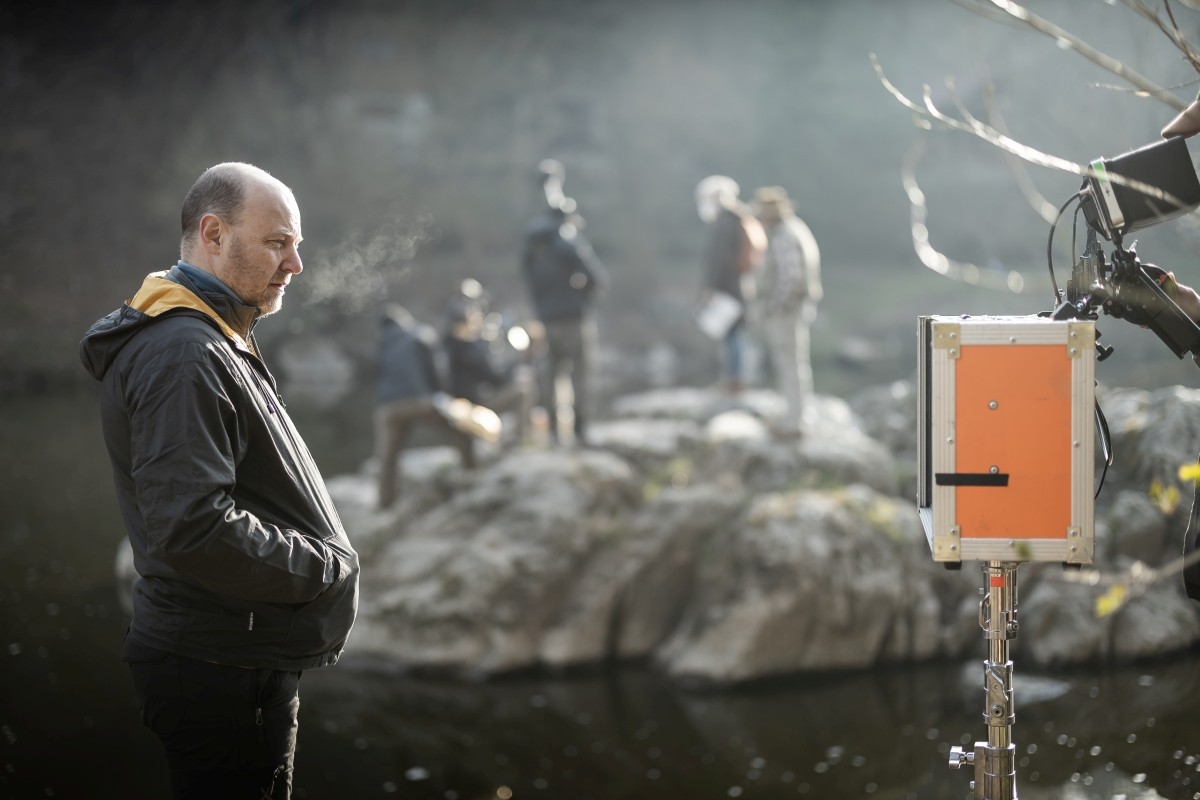
BUSHMAN: What did you enjoy most about the TV commercial project for BUSHMAN?
PETR: That it was your first TV campaign. I enjoyed being there because I thought: That's good, twenty years ago, when I started travelling and filming, so was BUSHMAN, and now that BUSHMAN is entering television as a big respected company, I'm here again. . That's awesome.
BUSHMAN: How come?
PETR: When Mirek Náplava and I founded the Camera Incognita association sometime in the 1990s, the aim was to travel around the world and record and process data on the changes in places that are unique and will never again be the way we remember them. At that time, we had the BUSHMAN brand as one of our valuable partners for five, maybe seven years - right from the beginning, the company trusted us and supported us. I have great feelings for the company and the people around it, including the founder Jindřich Melichar… that it’s about harmony, similar values, doing things that make sense. Not "just about producing a profit" – and although I don’t question this in a commercial company, there should also remain some awareness of meaning and some goal other than purely financial. And BUSHMAN has it, and that’s why I like the brand so far.
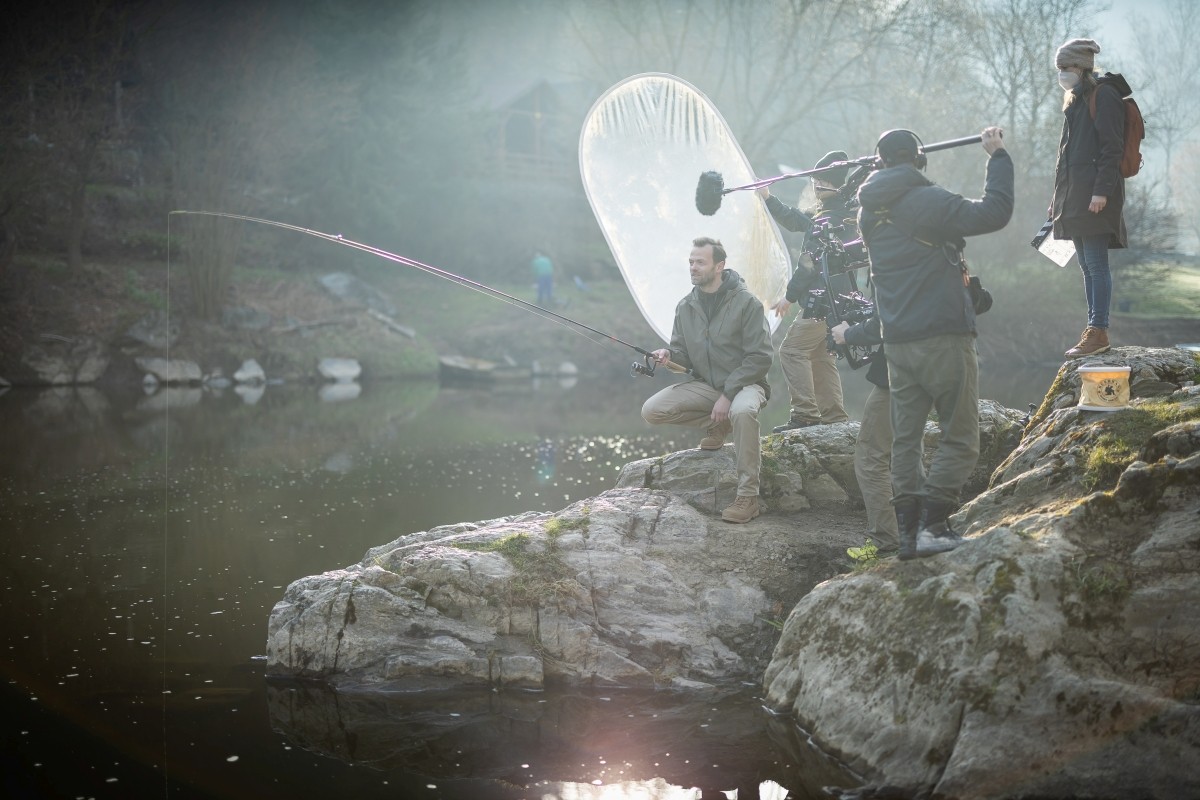 BUSHMAN: So we appreciate that, and I must say in retrospect that we are glad that our cooperation has worked out.
BUSHMAN: So we appreciate that, and I must say in retrospect that we are glad that our cooperation has worked out.
PETR: And it’s been quite visible. It wasn't the corporate operation that I know from other clients with whom we shoot ads – although I’ve got nothing against that with all its set up processes, responsibilities, competencies, performances, and that's probably okay. Here, I’ve enjoyed being able to look into the operation of the company with you. A lot of the processes have become more professional for you, but most of all I thought you just enjoyed it too. That you are happy, that you are at the shooting, that you are curious about it yourself and that it is also an adventure for you. And what is good and not quite usual, so when you tapped Lukáš Langmajer as your ambassador – the face of BUSHMAN, it was important for you that it was according to him. That the creative went in with the sense of it: that’s how we set it up so that we all liked it and we all found ourselves involved in it.
BUSHMAN: Do you always assemble the team you shoot with yourself, or does it happen that you have to work with whatever you’re given?
PETR: In the vast majority of cases, I put it together, and I always try to do it as I think it's the alpha and omega of the whole job. So far, I pretend to go see someone from time to time, if they let me. I sit down and see how it works for them. An important thing emerged for me: in any work team, there are conditions that are necessary, not just sufficient. A condition for a good job is that the crew must have people in it who want to work on the project.
For example, when I formed the crew for the film about Sigismund, I knew that they must be somehow fascinated by the phenomenon of Sigismund and Hanzelka. Likewise, now that I’m making a film with Mirek Bárta about the collapse of civilizations, I need people in the team who think about what’s happening to the world, and therefore the result of the film is important to them. And even though I was advertising for BUSHMAN, I knew I had to put together people who would find something in it that would make them happy to be there.
PETR: It was unusually filmed on a large and complex gimbal, a stabilizer, all in the hand. Such things are often shot from a tripod. But in order to shoot as much as you needed in one day, the classic shooting technology would be too slow. So suddenly we had an adventure in a new, atypical workflow - and suddenly it was a challenge for cameraman Ondra Hošek. For me, it was a challenge to manage and catch up. Production was a challenge to create imaginary places where it will be filmed, so that it can be achieved even with relocations and completely new setups. Several interesting things have come up with this, because of which you are suddenly curious how they will work and how it will all turn out - suddenly it’s an adventure. You know that you will be moving somewhere and trying something new; that was important to me.
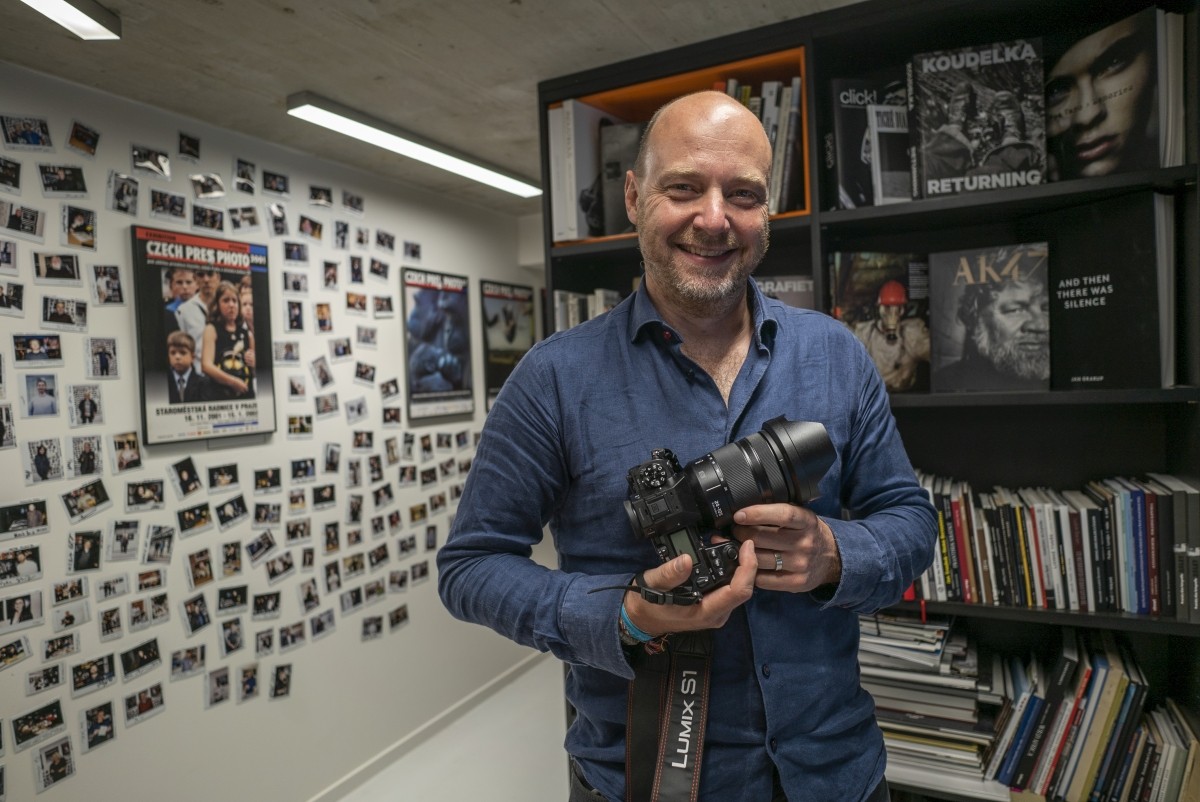 BUSHMAN: Speaking of challenges, has your life changed after a year and a half of the Pandemic?
BUSHMAN: Speaking of challenges, has your life changed after a year and a half of the Pandemic?
PETR: I started a YouTube Channel - it's definitely a child of the Corona Virus. Plus podcasts. I was beginning to feel that we had a lot of information here, half of which was bullshit, and that I needed access to some credible sources. I don't have to agree with them, but they are based on real experience, knowledge, skill. So I started inviting people like that to interviews and found that someone other than myself was interested too.
BUSHMAN: You have almost nineteen thousand followers… Has anyone ever told you that they’d like to talk to you?
PETR: They join up and I'm very happy, yes I'm very happy about that. But back to the audience: I'm very anxious and I’ve got to be careful not to be controlled by the number of followers. It's very dangerous on YouTube, and I've found that esoterics, scaring people, and mobilization against politicians work great to increase viewership. And that it would be very easy to make esoteric videos that scare the shit out of people and ideally mobilize them against politicians, then the numbers would go up very quickly. But I don't want that, that's why I consciously put videos there that I enjoy and are important to me, but they don't go a priori after viewing - they are sociological, philosophical or psychological topics, for example. And I know they won't get hundreds of thousands of views. But it seems to me that the voices of, for example, Anna Hogenová, Pavel Ryba, Nora Vlášková and others need to be heard.
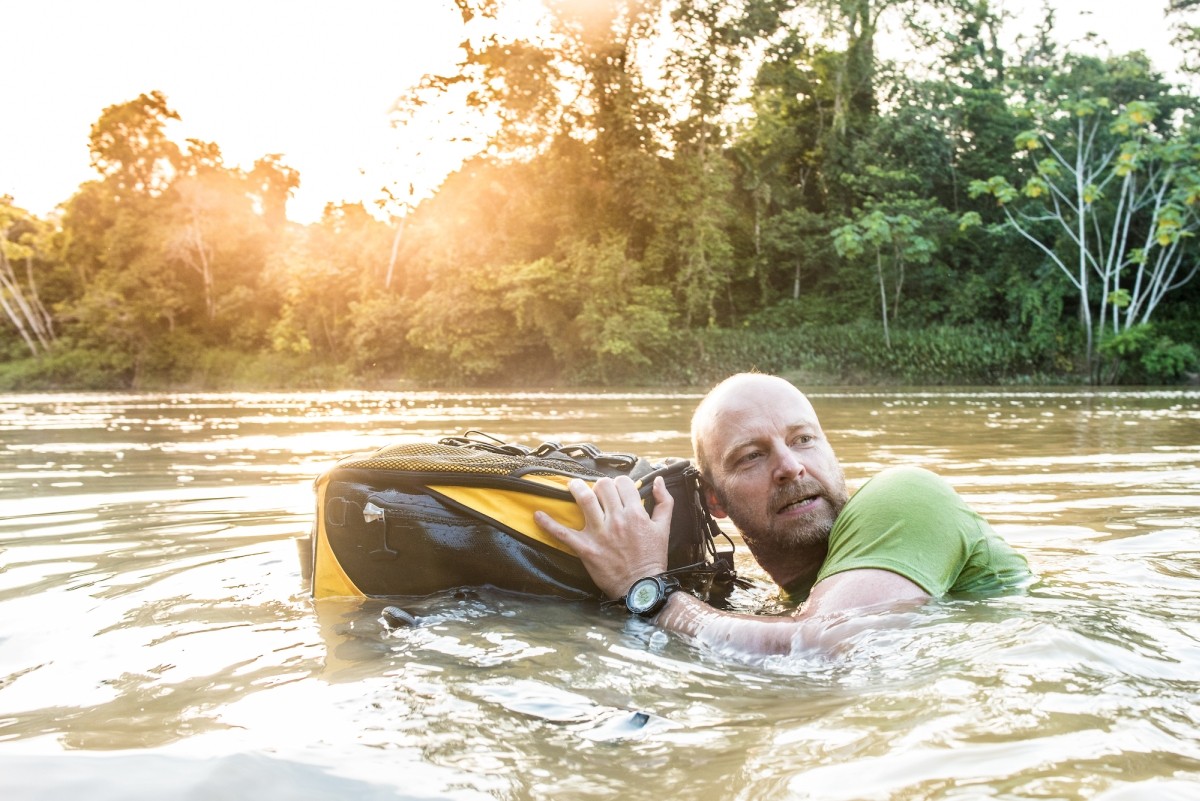 BUSHMAN: Do you do YouTube just for fun?
BUSHMAN: Do you do YouTube just for fun?
PETR: I'm just glad it works. I shoot it all in my free time, with my wife, who is a hairdresser, and we’ve invested a lot of money in it and now I am exactly at the stage where I’m saying to myself: So now it should be at least at zero loss. Ideally, I could hire a second editor and absorb the cost of the cameraman and the equipment. Now I have launched a donation opportunity, an actual payment, a monetization system, so that whoever wants to support me in some way can.
It also has a second meaning, it's a certain reaching to the ground: maybe in a month or two I'll find out that it's nice that people listen to it, but no one wants to pay 80 crowns a month for it, or there is no company that would she wanted to buy a partnership for half a year or a month, so it's all my youtubing, so shit, and it's time to cancel it and let it float.
BUSHMAN: Anyway, I'm full of respect for anyone who can just leave everything behind and go away for a long time...
PETR: I make sure I don't depend on all those things. The only things I do depend on in my life are my loved ones, friends, wife, children. There I think that a certain balanced dependence should be, and is, right: one should put oneself into relationships with one's loved ones and be devoted to them. But I don't want to be addicted to my own work without this anchor… for me, the world would collapse. That's why I try not to build some huge company. I have friends around me who bought real estate, started building editing rooms, large-scale production systems - and suddenly they are completely dependent on having a certain monthly workload to be able to use it all. At this moment, they’re in a tight spot, in a way they become slaves to their own work, which they recently loved. And I try not to be in it like this.
Hey, but maybe I'm getting out all the time right now anyway. Seriously. Maybe it's just that I do what I enjoy, and that's how it's put together.
How do beautiful women relate to this desire to know all corners of the world? Why will Petr never finish a film about climbing a hitherto undiscovered journey to the top of Table Mountain in Venezuela? And how did his joint project with Egyptologist Miroslav Bárta on the collapse of civilizations come about? Not only will you learn this soon in the continuation of our interview with the Brno native, director and documentary filmmaker, producer, writer, presenter, traveller and Youtuber, Petr Horký.
You can learn more about Petr Horký and his work with these links:
Petr Horký is also a polar explorer, and as he says, “when I am at the Pol, I meet my true self inside me. And it’s the bit with a heroic dimension.” Here we come to the roots of his collaboration with the BUSHMAN brand, for which he directed the first television spot in its history. But let's not run ahead of ourselves…

BUSHMAN: On your web pages you have a business card with Petr Horký - director and polar explorer on it, and petr_horky_polarnik on Instagram. Why the polar? Did you have that desire to go there from the beginning and what were you looking for, or was it just a given that you’d do this?
PETR: As a little boy, I was fascinated by books about the first polar explorers who let their ships freeze in the ice. Shackleton and the Endurance Expedition Across Antarctica was one, and Nansen and his expedition with the ship Fram to the North Pole was another. Then I saw a film by Pala Barabáš with Peter Valušiak, whom I still consider as my friends today, about the transfer of the North Pole from Russia to Canada. It culminated when I looked at frozen Greenland below me on my flight to America for perhaps forty minutes. I already said to myself: I want to be there, I want to go there. Then one day I found out that I might be able to raise the money for just such a trip to the North Pole.
BUSHMAN: In addition to money, such an expedition also requires a strong physique…
PETR: That's when I had a bit of a beer belly and I was starting to think that something like such an adventure wasn’t for me anymore. But I said to myself: Dude, now you have the opportunity to fulfill one of your biggest dreams in life, and the only one who stands in the way is yourself. At least I have to try it, even if I have to say that I failed. But at least I won't have to live with the knowledge that I'm the one who tripped up the dream. I started training, worked hard for a year and Mirek Jakeš, a Czech polar ace, started teaching me how to work in the polar regions - his method is very close to the style of ‘jump into the water and swim’. So we went to the North Pole in 2008 and he says: Yeah you don't have these gloves? It's probably going to be cold, um, well, yeah. But one learns really well this way, he has given me great know-how. When I crossed Greenland two years later, I went with soldiers from British Special Forces, and they learned from me stuff from the Jakes Polar School. Because the British army can't do it the way Jakes can do it, and the way he taught me.
BUSHMAN: What did you learn from the Pole? What fascinates you most about the place?
PETR: Of course, encounters with wildlife - these are the places in the world where you still won't come across a hotel. And then when you get down to the line, you find yourself close to what the BUSHMAN brand is about.
 In the modern world, there are so few situations where I can feel like a real guy. To some it may sound pathetic or just boyish bullshit, but I think a guy's life should have a certain dimension of heroism. Just as I think that part of a woman's beauty is kindness, attention and sensitivity, so I think that part of manhood is heroism. And it doesn't have to be in the sense of saving passengers in the water as the Titanic sinks, but maybe it’s to have the courage to stand up to a boss who's lying. The courage to leave a job where they want to make you a moron. The courage to stop work and go to the Pole for two or three months, not knowing how it will be after returning to work and other things, or how it will actually turn out on your own journey. When I'm at the Pole, I then meet the guy inside me. And also the bit with its dimension of heroism.
In the modern world, there are so few situations where I can feel like a real guy. To some it may sound pathetic or just boyish bullshit, but I think a guy's life should have a certain dimension of heroism. Just as I think that part of a woman's beauty is kindness, attention and sensitivity, so I think that part of manhood is heroism. And it doesn't have to be in the sense of saving passengers in the water as the Titanic sinks, but maybe it’s to have the courage to stand up to a boss who's lying. The courage to leave a job where they want to make you a moron. The courage to stop work and go to the Pole for two or three months, not knowing how it will be after returning to work and other things, or how it will actually turn out on your own journey. When I'm at the Pole, I then meet the guy inside me. And also the bit with its dimension of heroism.When I talked to Sigismund and Hanzelka years ago, they recounted how StB agents had summoned them for questioning - clearly that they were afraid because they did not know if they would finish them off or threaten them with their loved ones. But they said: We went there saying that if we weren't afraid of skull hunters in Ecuador, we wouldn't be afraid of some lousy secret police agent. And that's it: these things suddenly give a person strength in other life situations.
BUSHMAN: I assume that even when you’re shooting…
PETR: Come on! I talked about it with Robert Fulghum, who wrote the book Everything I Really Need to Know, I learned in kindergarten. And I told him that I would add that everything I needed to do in adulthood, I learned from my Polar expeditions. He laughed and said: Yeah, but it's still coming out of that kindergarten.
 At the Pole, I learned a lot of things that are good for everyday life. One of them is that if I can handle it, I don't need to explain it to everyone and show it off. This means that when I'm on the set, I don't need everyone to sit on their asses and say: Bacha, be quiet, director Horký is creating and now something arises out of his ideas – so you can't talk. Hey, I just want the shot to be bloody good, and if I feel like the cameraman has a better view of how it should be done than I do, I'll invite him, come tell me how we're going to shoot it. If I feel that the actor is important for this or that he needs some adjustment to the dialogue or whatever, I’ll invite him over and we’ll discuss it together…
At the Pole, I learned a lot of things that are good for everyday life. One of them is that if I can handle it, I don't need to explain it to everyone and show it off. This means that when I'm on the set, I don't need everyone to sit on their asses and say: Bacha, be quiet, director Horký is creating and now something arises out of his ideas – so you can't talk. Hey, I just want the shot to be bloody good, and if I feel like the cameraman has a better view of how it should be done than I do, I'll invite him, come tell me how we're going to shoot it. If I feel that the actor is important for this or that he needs some adjustment to the dialogue or whatever, I’ll invite him over and we’ll discuss it together…One small thing, but a specific situation from shooting this spot for BUSHMAN with Lukáš Langmajer: we are on the platform and I say to him: I would really like you to stand here with the script and say a passage from it that could relate to everyday life. Can't you find something to suit you like that? And he said: That's interesting, I'll try to find something. The moment we share the creative process together, the result is always better. Two heads are better than one, even if he’s a world record holder running solo.
BUSHMAN: You have a lot of shooting experience, but what do you prefer to shoot: what you come up with by yourself, or to order for someone else?
PETR: It applies to any human activity, and as a filmmaker I say that the filmography of films and projects I have not made is as important as the filmography of projects I have made. By that I mean that what I don't want to shoot, I refuse. Thanks to that, with everything I've shot - whether it's a product video, a movie for a cinema, a series with the climber Adam Ondra or an advertisement for BUSHMAN - I'm able to say that I had a reason to go for it - and I'm glad I'm was there: I’ve enjoyed it and it's a part of my life. Fate was kind to me in that I was never put in a position that I had to accept an offer I didn't want, and then maybe be ashamed of the result.
To this I can add, for example, a film with Miroslav Zikmund, his biography - he was beautiful, I made it up myself, it was produced by my company, it made huge numbers in cinemas, it reached nominations for the Czech Lion, it had beautiful ratings at CSFD… a huge joy to this day, and it was sometime in 2015. The series with Adam Ondra, was produced by Czech Television Brno: they invited me to do it as director and I was clearly there as a hired hand – but I really enjoyed it and I got over it with joy. Or now we are finishing a film with Egyptologist Mirek Bárta for cinemas - again a project of my company Piranha Film in co-production with several others, and I am happy about that. Even an advertisement for BUSHMAN – taken on as a hired hand, actually on a commercial product – but it’s given me great memories, I’ve enjoyed it and I'm happy about it. Everything gives you something.

BUSHMAN: What did you enjoy most about the TV commercial project for BUSHMAN?
PETR: That it was your first TV campaign. I enjoyed being there because I thought: That's good, twenty years ago, when I started travelling and filming, so was BUSHMAN, and now that BUSHMAN is entering television as a big respected company, I'm here again. . That's awesome.
BUSHMAN: How come?
PETR: When Mirek Náplava and I founded the Camera Incognita association sometime in the 1990s, the aim was to travel around the world and record and process data on the changes in places that are unique and will never again be the way we remember them. At that time, we had the BUSHMAN brand as one of our valuable partners for five, maybe seven years - right from the beginning, the company trusted us and supported us. I have great feelings for the company and the people around it, including the founder Jindřich Melichar… that it’s about harmony, similar values, doing things that make sense. Not "just about producing a profit" – and although I don’t question this in a commercial company, there should also remain some awareness of meaning and some goal other than purely financial. And BUSHMAN has it, and that’s why I like the brand so far.
 BUSHMAN: So we appreciate that, and I must say in retrospect that we are glad that our cooperation has worked out.
BUSHMAN: So we appreciate that, and I must say in retrospect that we are glad that our cooperation has worked out.PETR: And it’s been quite visible. It wasn't the corporate operation that I know from other clients with whom we shoot ads – although I’ve got nothing against that with all its set up processes, responsibilities, competencies, performances, and that's probably okay. Here, I’ve enjoyed being able to look into the operation of the company with you. A lot of the processes have become more professional for you, but most of all I thought you just enjoyed it too. That you are happy, that you are at the shooting, that you are curious about it yourself and that it is also an adventure for you. And what is good and not quite usual, so when you tapped Lukáš Langmajer as your ambassador – the face of BUSHMAN, it was important for you that it was according to him. That the creative went in with the sense of it: that’s how we set it up so that we all liked it and we all found ourselves involved in it.
BUSHMAN: Do you always assemble the team you shoot with yourself, or does it happen that you have to work with whatever you’re given?
PETR: In the vast majority of cases, I put it together, and I always try to do it as I think it's the alpha and omega of the whole job. So far, I pretend to go see someone from time to time, if they let me. I sit down and see how it works for them. An important thing emerged for me: in any work team, there are conditions that are necessary, not just sufficient. A condition for a good job is that the crew must have people in it who want to work on the project.
For example, when I formed the crew for the film about Sigismund, I knew that they must be somehow fascinated by the phenomenon of Sigismund and Hanzelka. Likewise, now that I’m making a film with Mirek Bárta about the collapse of civilizations, I need people in the team who think about what’s happening to the world, and therefore the result of the film is important to them. And even though I was advertising for BUSHMAN, I knew I had to put together people who would find something in it that would make them happy to be there.
It all fits! Petr Horký directed our BUSHMAN sponsored spots. You can see how it all went in the film about the films (directed by Miroslav Hrdý)
BUSHMAN: What exactly, for example?PETR: It was unusually filmed on a large and complex gimbal, a stabilizer, all in the hand. Such things are often shot from a tripod. But in order to shoot as much as you needed in one day, the classic shooting technology would be too slow. So suddenly we had an adventure in a new, atypical workflow - and suddenly it was a challenge for cameraman Ondra Hošek. For me, it was a challenge to manage and catch up. Production was a challenge to create imaginary places where it will be filmed, so that it can be achieved even with relocations and completely new setups. Several interesting things have come up with this, because of which you are suddenly curious how they will work and how it will all turn out - suddenly it’s an adventure. You know that you will be moving somewhere and trying something new; that was important to me.
 BUSHMAN: Speaking of challenges, has your life changed after a year and a half of the Pandemic?
BUSHMAN: Speaking of challenges, has your life changed after a year and a half of the Pandemic?PETR: I started a YouTube Channel - it's definitely a child of the Corona Virus. Plus podcasts. I was beginning to feel that we had a lot of information here, half of which was bullshit, and that I needed access to some credible sources. I don't have to agree with them, but they are based on real experience, knowledge, skill. So I started inviting people like that to interviews and found that someone other than myself was interested too.
BUSHMAN: You have almost nineteen thousand followers… Has anyone ever told you that they’d like to talk to you?
PETR: They join up and I'm very happy, yes I'm very happy about that. But back to the audience: I'm very anxious and I’ve got to be careful not to be controlled by the number of followers. It's very dangerous on YouTube, and I've found that esoterics, scaring people, and mobilization against politicians work great to increase viewership. And that it would be very easy to make esoteric videos that scare the shit out of people and ideally mobilize them against politicians, then the numbers would go up very quickly. But I don't want that, that's why I consciously put videos there that I enjoy and are important to me, but they don't go a priori after viewing - they are sociological, philosophical or psychological topics, for example. And I know they won't get hundreds of thousands of views. But it seems to me that the voices of, for example, Anna Hogenová, Pavel Ryba, Nora Vlášková and others need to be heard.
 BUSHMAN: Do you do YouTube just for fun?
BUSHMAN: Do you do YouTube just for fun?PETR: I'm just glad it works. I shoot it all in my free time, with my wife, who is a hairdresser, and we’ve invested a lot of money in it and now I am exactly at the stage where I’m saying to myself: So now it should be at least at zero loss. Ideally, I could hire a second editor and absorb the cost of the cameraman and the equipment. Now I have launched a donation opportunity, an actual payment, a monetization system, so that whoever wants to support me in some way can.
It also has a second meaning, it's a certain reaching to the ground: maybe in a month or two I'll find out that it's nice that people listen to it, but no one wants to pay 80 crowns a month for it, or there is no company that would she wanted to buy a partnership for half a year or a month, so it's all my youtubing, so shit, and it's time to cancel it and let it float.
BUSHMAN: Anyway, I'm full of respect for anyone who can just leave everything behind and go away for a long time...
PETR: I make sure I don't depend on all those things. The only things I do depend on in my life are my loved ones, friends, wife, children. There I think that a certain balanced dependence should be, and is, right: one should put oneself into relationships with one's loved ones and be devoted to them. But I don't want to be addicted to my own work without this anchor… for me, the world would collapse. That's why I try not to build some huge company. I have friends around me who bought real estate, started building editing rooms, large-scale production systems - and suddenly they are completely dependent on having a certain monthly workload to be able to use it all. At this moment, they’re in a tight spot, in a way they become slaves to their own work, which they recently loved. And I try not to be in it like this.
Hey, but maybe I'm getting out all the time right now anyway. Seriously. Maybe it's just that I do what I enjoy, and that's how it's put together.
How do beautiful women relate to this desire to know all corners of the world? Why will Petr never finish a film about climbing a hitherto undiscovered journey to the top of Table Mountain in Venezuela? And how did his joint project with Egyptologist Miroslav Bárta on the collapse of civilizations come about? Not only will you learn this soon in the continuation of our interview with the Brno native, director and documentary filmmaker, producer, writer, presenter, traveller and Youtuber, Petr Horký.
You can learn more about Petr Horký and his work with these links:
Article categories
ALL ARTICLES
REPORTS
Get inspired
OUR PARTNERS
GETTING TO KNOW US
BUSHMAN Clothing Care















